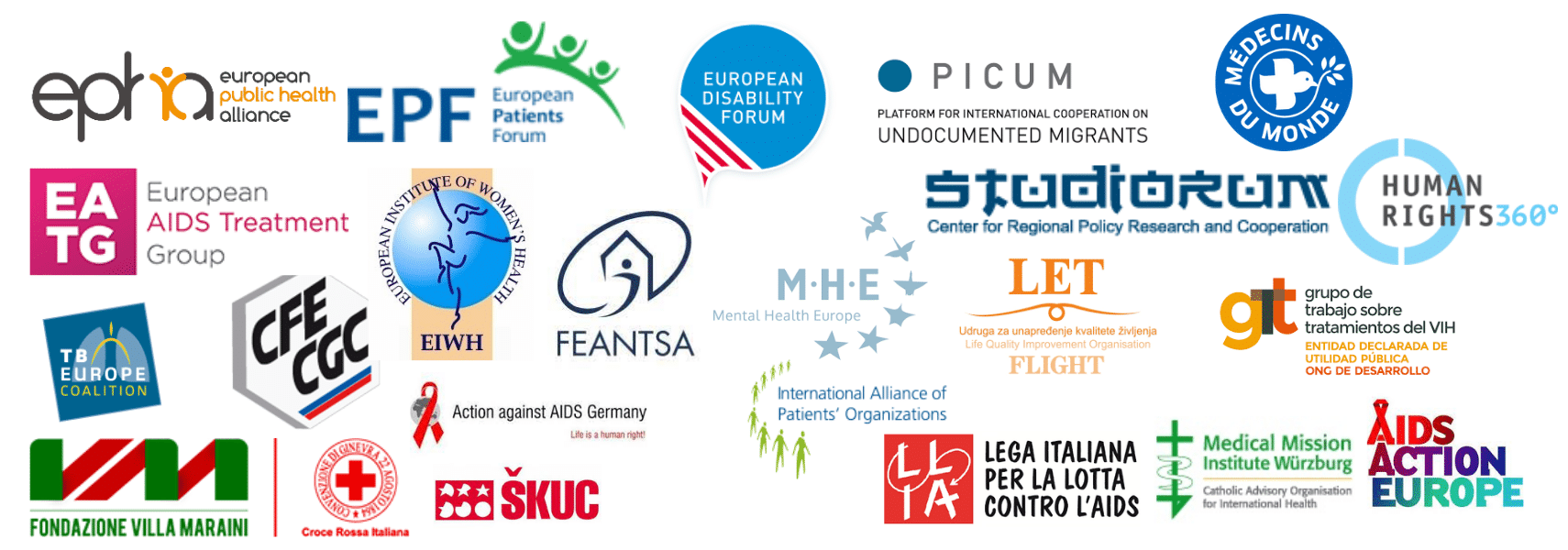The European Public Health Alliance, the European Patients Forum, the European Disability Forum and the Platform for International Cooperation on Undocumented Migrants have today written to the European Commission to ask them to implement a 12 point plan to ensure equitable allocation and prioritisation of COVID-19 vaccines. In a letter to European Commissioners Kyriakides, Dalli and Schmit, supported by 19 other national and European health and civic organisations, they call for people from marginalised communities such as the homeless; refugees, asylum seekers, and undocumented migrants; persons with disabilities (whether physical, sensory, intellectual or psychosocial disabilities) and their support network; prisoners, Roma, ethnic minorities; sex workers; to urgently be included and prioritised in EU Member States’ national vaccination strategies.
Despite the identification of vulnerable populations as priority groups in the October 2020 European Commission Communication on preparedness for COVID-19 vaccination strategies and vaccine deployment, more action is needed to ensure vaccine equity becomes a reality across the EU:
12 recommendations to ensure vaccine equity in the EU
- Highlight the risks faced by disadvantaged populations confronting barriers to access health systems and issue appropriate guidance
- Meaningfully collaborate with civil society and community-based organisations through a structured policy dialogue to gather population-specific information on vaccine uptake and urge EU national governments to involve them in planning, outreach, implementation and monitoring of vaccine strategies; .
- Facilitate exchanges of best practices and solutions across the EU, particularly on registration systems which are flexible and with limited documentation requirements, to reducing the systematic barriers to health care access;
- Review and track implementation of the October 2020 Communication on vaccination strategies and provide further guidance to Member States, in order to turn vaccine equity into a reality within Europe;
- Collect country-specific quantitative and qualitative evidence from each Member State on the capability and accessibility of vaccination programmes and healthcare services for people in vulnerable situations;
- Support and launch accessible and culturally-aware public information awareness, outreach and education campaigns, to increase uptake, boost vaccine confidence, and tackle vaccine hesitancy, misinformation and disinformation;
- Work with Member States to promote easily accessible delivery sites, mobile vaccination teams, translation services, suppression of financial burden and ensure universal coverage by removing requirements related to health-insurance registration;
- Allocate EU COVID-19-related recovery funds to vaccination information campaigns, targeting groups who may be left behind;
- Ensure transparency in the administration of doses per Member State while safeguarding personal data and confidentiality, to understand the statistical and socio-demographic characteristics of those vaccinated, without compromising privacy or imposing restrictions to vaccination.
- Prioritise administration of single-dose vaccines to vulnerable populations, in order to reduce access barriers, depending on vaccine availability, while ensuring choice based on free and informed consent;
- Request the European Centre for Disease Coordination and Control (ECDC) to support the exchange of knowledge and experience between Member States and monitor access for key vulnerable populations, by using relevant equity-related indicators, involving civil society and local community organisations.
- Address long-standing health inequalities, through improving access to healthcare (besides emergency care) for marginalised and vulnerable groups, by monitoring health inequities and supporting more research and action-driven strategies, particularly looking at intersecting factors that may place certain groups at high-risk.
EPHA, EPF, EDF and PICUM also highlight the need for more inclusive and fair public policies, to address the systemic factors which result in certain communities being side-lined from critical services and public health initiatives, with equity as the guiding principle of the COVID-19 vaccination roll-out. Looking ahead, they call on the EU to fulfil its vital role in supporting Member States to achieve effective and inclusive vaccination programmes, consistent with the imperatives of public health and with European values of inclusion and solidarity.

